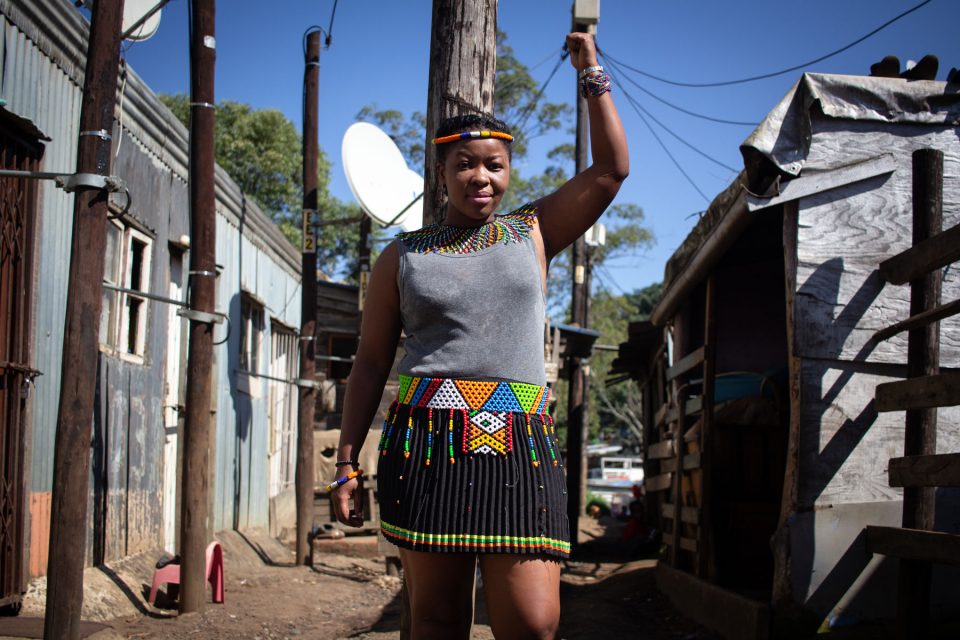‘We cannot celebrate Youth Month’
Young activists in KwaZulu-Natal are stepping up in the face of intimidation and hostility to advocate around issues ranging from women’s rights to HIV and Aids, economic inequality and albinism.
Author:
1 July 2020

“The needs of informal settlement dwellers are acute. Young women and girls have little to look up to. A better life for them is so close, yet untouchable. Why are there people living in the shacks? How are they surviving and for how long can they survive?” asks Busisiwe Diko.
Diko has been active at the forefront of promoting shack dweller’s rights and advocating for the inclusion of young, black women in land and housing policy making. She is currently a leader in the shack dwellers movement Abahlali baseMjondolo’s youth wing.
“I grew up in a rural village in the Eastern Cape, where struggle for survival was a daily burden. As I grew older, I was excited to seek brighter opportunities in the land of the promise, the city. The illusion that life was going to be easier and fair to a young black girl crashed as soon as I arrived,” says Diko.
Related article:
The 25-year-old activist says the social movement she represents is focused on contentious politics, that of challenging economic, gender and social inequalities, as well as the evictions her community in the eNkanini shack settlement in Cato Crest, Durban, face.
“The narrative of a ‘woman’s place’ 26 years into democracy needs to be critically discussed. We need to highlight both the challenges and the progress of the women’s economic advancement inside informal settlements,” she says.
Path to activism
Despite facing intimidation and hostility from members of her community, Diko says she won’t be stopped. Her journey to human rights advocacy began when she arrived in Durban from Lusikisiki in the Eastern Cape as a student in 2011. Unable to afford student accommodation, she stayed with a family member in a shack settlement in Cato Manor, where she was vocal about issues of eviction and the lack of public services in communities that are legally recognised – usually attained through a court interdict – by the municipality, such as eNkanini.
“The structure and system of the city is rooted in capitalism, a sink-or-swim experience. I soon realised that life in the urban areas in their anti-poor conditions needed to be scrutinised. I can no longer watch my people grow and die in the shacks. The government needs to take accountability for worsening shack dweller’s conditions through hostility, violence and lack of service delivery. This has a dangerous outcome, especially for the young people living in informal settlements, rural areas or townships, those dispossessed and those in the diaspora,” she said.
“The well-known notion is that life emjondolo [shack home], the picture of its people and its future, is a bleak and uncertain one,” Diko explained, pointing out that “we need to eliminate that and plant a new seed. We need to work harder claiming the spaces we occupy and the places we go as black women, because belonging and identity has been restricted from us for a long time.”

Inherited strength
Inamandla Masinga is a queer woman with albinism who lives in a society antagonistic to both. The 24-year-old from Matikwe, Inanda, in KwaZulu-Natal advocates for HIV and Aids and sexual reproductive rights for the province’s youth as part of the United Nations Youth Delegate Programme. She finds advocating for the protection of people with albinism the toughest and is working with the Albinism Society of South Africa “to break boundaries on sexuality and disability”.
“A lot of groundwork has been done to educate people about accepting people living with albinism, how to care and protect them, yet not much is being done to empower the people living with albinism. Many of them lack self-confidence and feel excluded because society has manifested fake ideas on albinism,” said Masinga.
“As an albino, I already stand out, so why not harness that ability to draw attention and use it to empower people? All South African women deserve space that is safe, and we all have to do our part and take a stand,” she added.
Masinga says fierce feminism coupled with compassion, justice and understanding will allow more young women to feel safe and that they belong and can thrive in their communities and the areas in which they live. “Black women, women living with disabilities and the LGBTQ[I+] have to begin and propel further the message of taking up space. Even our Miss Universe, Zozibini Tunzi, hailed this message and reminded us to take the initiative and do our best in each corner.
Related article:
“I am constantly working towards making a difference in the places and spaces that I exist in. The aim is to make welcoming environments for young, black women in life spectrums, so to enable them a fairer opportunity to thrive and succeed, or just live a normal life, without fear of being killed, labelled and cast away.”
Masinga, whose first name means “of great strength”, said her drive for fierce feminism and social activism came from her mother. The aftermath of her mother’s death played a critical role in her life story and how she uses past experiences to make a positive effect on her community.
“My mother also had albinism, she was vocal and strong and allowed me to be my true self from a young age. She died when I was eight, and left behind my younger brother and I. Soon after, our lives drastically changed. We faced difficulties growing up with an alcoholic grandmother. As the older one, I quickly realised I had to be acute with my focus and create a stronger character to survive better,” she said.

The vital role of activists
Masinga and Diko’s efforts to expose injustice and amplify diverse voices are increasingly important at a time of rising inequality, gender-based violence and pertinent socioeconomic challenges and constraints. This is especially true for activists focused on land, housing and the vulnerable, because its effects, causes and solutions are so varied and complex. Activists play a vital role in providing answers.
“As both a product of a deeply traumatic history and the failure of the post-apartheid government to prioritise its poor citizens, young black women remain at the far end of development. On paper, the South African Constitution, we are a fair and equal state, yet we battle as an economically unequal country, an ironic contradiction. While this is so, while we millions still suffer for dignified housing, a fair share of quality education and economic inclusion, we cannot celebrate Youth Month,” concluded Diko.
In terms of the work needed to take this activism and advocacy forward, Masinga said, “the goal now should be to equip, encourage and include people living with albinism in societies. To combat the alarming abductions, killings and heinous crimes towards people living with albinism requires extensive social work and construction, through awareness campaigns that will address the root factor to these crimes.”


